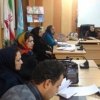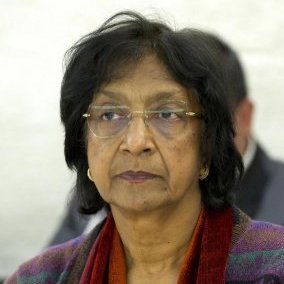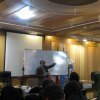
UN human rights chief urges US to close Guantánamo detention centre
UN human rights chief urges US to close...
 “I am deeply disappointed that the US Government has not been able to close Guantánamo Bay, despite repeatedly committing itself to do so,” said the High Commissioner for Human Rights, Navi Pillay.
“I am deeply disappointed that the US Government has not been able to close Guantánamo Bay, despite repeatedly committing itself to do so,” said the High Commissioner for Human Rights, Navi Pillay.
According to Ms. Pillay’s office (OHCHR), around half of the 166 detainees in the centre have been cleared for transfer to their home countries or third countries for resettlement. However, they have remained there, while others have reportedly been designated for indefinite detention.
“Some of them have been festering in this detention centre for more than a decade,” Ms. Pillay said. “This raises serious concerns under international law. It severely undermines the United States’ stance that it is an upholder of human rights, and weakens its position when addressing human rights violations elsewhere.”
Ms. Pillay noted that four years ago she had welcomed the announcement by President Barack Obama saying he was placing a high priority on closing Guantánamo and establishing a system to protect the fundamental rights of detainees. She further welcomed the White House’s reiteration of this commitment last week, citing Congressional legislation as the main obstacle for progress on the issue.
However, Ms. Pillay said she was concerned that in spite of these commitments, abuses to detainees’ human rights have continued in a systematic manner year after year, leading many prisoners to take desperate measures such as going on hunger strikes.
“We must be clear about this: the United States is in clear breach not just of its own commitments but also of international laws and standards that it is obliged to uphold. When other countries breach these standards, the US – quite rightly – strongly criticizes them for it.”
Ms. Pillay also expressed alarm over the continued obstacles the National Defense Authorization Act of 2013 has created for the closure of the detention facility, as well as for the trial of detainees in civilian courts, where warranted, or for their release. The Act was signed into law by Mr. Obama on 3 January despite previous threats to veto its renewal.
Guantánamo detainees who are accused of crimes should be tried in civilian courts, particularly as the military commissions – even after improvements made in 2009 – do not meet international fair trial standards, Ms. Pillay said.
“Anyone who is deprived of his or her liberty by arrest or detention is entitled, under international human rights law, to regular review of the lawfulness of their detention and to be released if the detention is not lawful,” she said. “Any ensuing judicial proceedings must scrupulously respect due process and fair trial standards.”
The High Commissioner emphasized that as long as Guantánamo remains open, US authorities must make every effort to observe the detainees’ rights. “Under human rights law, people deprived of their liberty must be treated with humanity and with respect for their inherent dignity,” she said.
Ms. Pillay also called on the United States Government to allow UN Human Rights Council experts full and unfettered access to the detention centre as well as to detainees.
 Reload
Reload


